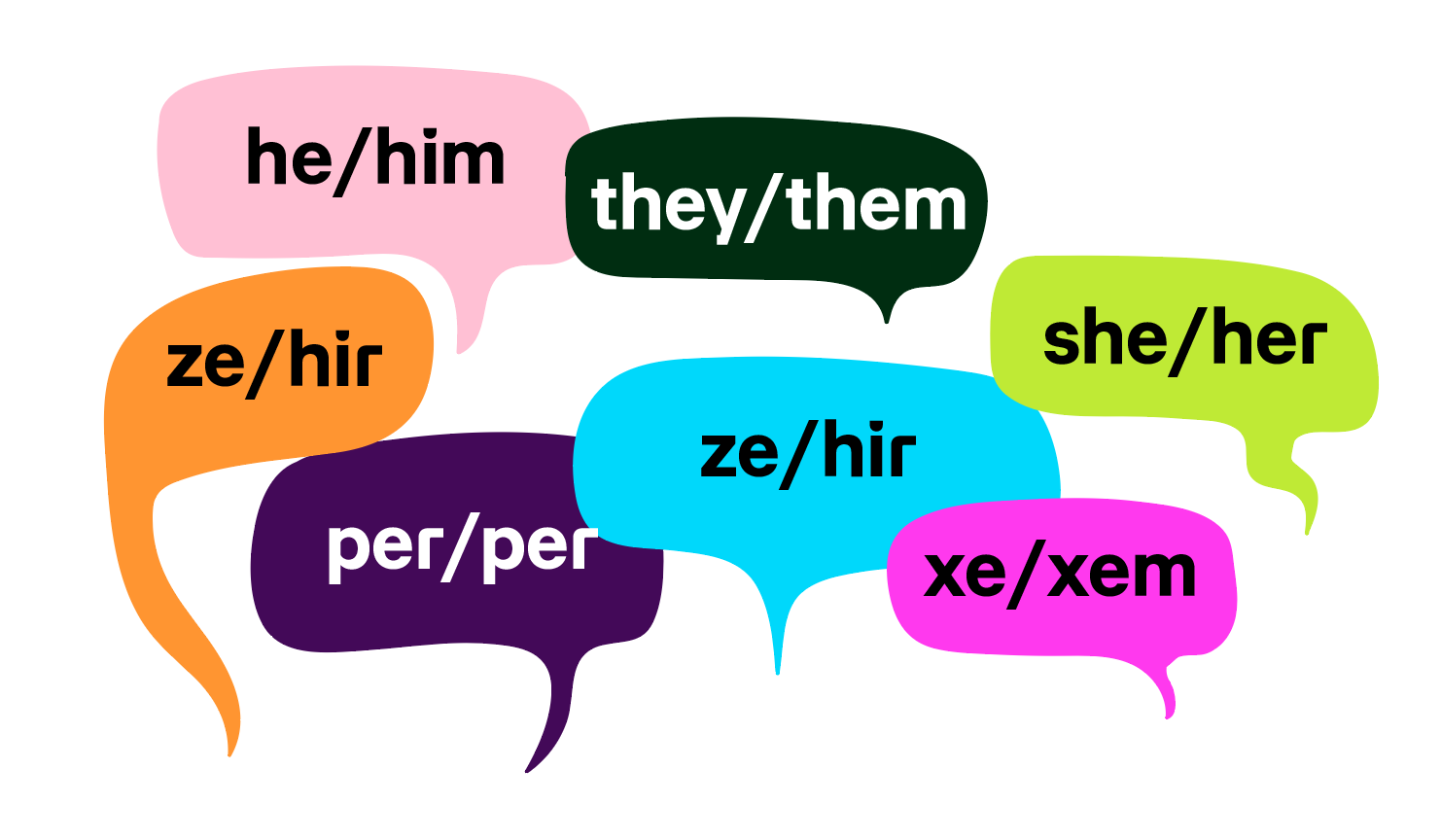As a Union, we have adopted a voluntary initiative off the back of a student led campaign to help support our LGBTQIA+ colleagues and peers feel more widely accepted and supported. You may notice across the Students' Union and University emails that we are now including our preferred pronouns as part of our email signatures.

What are pronouns?
Pronouns are how you refer to someone when you aren’t using their name; they’re one of the ways we choose to portray our identities, and the way many of us express our gender. We all have pronouns but they are most commonly openly declared by the LGBTQIA+ community and it’s vital that this changes. It can be alienating for the community, which is why we need to normalise everyone introducing them with the same importance as their name. Some inividuals may also use neopronouns, which are pronouns that fall away from the common pronouns such as she/her, he/him and they/them - some examples can be seen in the above illustration.
Why are they important?
It has been normalised as part of society to assume a person’s gender or preferred pronouns by their physical appearance. Someone who presents themselves in either a feminine or masculine way can be assumed to use the pronouns commonly associated with the way gender is commonly presented. This however can be harmful to individuals as not all individuals identify with the gender they were assigned at birth (cisgender), this can lead to them experiencing a sense of gender dysphoria due to their biological sex not aligning with their gender identity. It is important to ask for and respect people’s preferred pronouns to limit gender dysphoria and to stop individuals from being misgendered.
How can you step up?
We want you to challenge the idea that you can simply assume someone's pronouns by the way they look and for you to help normalise announcing your pronouns.
Here are some ways in which you can be more inclusive in your everyday language:
- When you introduce yourself, also introduce your pronoun: This can remind people it may not always be obvious what pronoun someone uses.
- Join us by putting your pronouns in your email signature and/or social media profile.
- Try to avoid addressing groups or people with gendered language, e.g., instead of using ‘Ladies and Gentlemen’, use the word ‘everyone’ to address a group.
If you’re not sure what someone’s pronouns are, you can always ask them. However, you should be mindful of the space you are in. You don't want to force someone to out themselves to you especially if you are in a space that might not be safe for a trans or non-binary person.
We all make mistakes, and we are only human! Don’t beat yourself up if you slip up, apologise and move on. If you want to know more or are just generally interested in educating yourself we've popped a few of our favourite resources below.
How to be an ally
When (and how) to ask about pronouns
LGBT Life Centre
What have we been doing as a Union?
Your LGBTQ+ Executive Officer for 2021-2022 Claire Sessions, developed a campaign which launched alongside Pride 2022 to adopt the use of pronoun badges as much as possible. Badges are readily available on the Help Your Shelf at High Wycombe, front desk at Uxbridge, and in Basin Café at Aylesbury so that you can pick up a badge as a small but effective way to demonstrate your allyship and we encourage everyone who feel comfortable with a badge to do so. If there is another location you would like to see the pronoun badges please do email us at union@bnu.ac.uk.
During Pride month we ran a 'Make your own badge' event where yiou could make your very own pronoun and pride flag badges. The LGBTQ+ Society will be providing plenty of opportunities to make your own badges - we have all of the materials all you need to do is come along so keep an eye out for these sessions on our what's on page.
As of November 2024, the LGBTQIA+ society run fortnightly sessions on different LGBTQIA+ related issues as well as representation within different areas each session. You can find out more about how to join the FREE society here: https://www.bucksstudentsunion.org/organisation/bnulgbtqia/